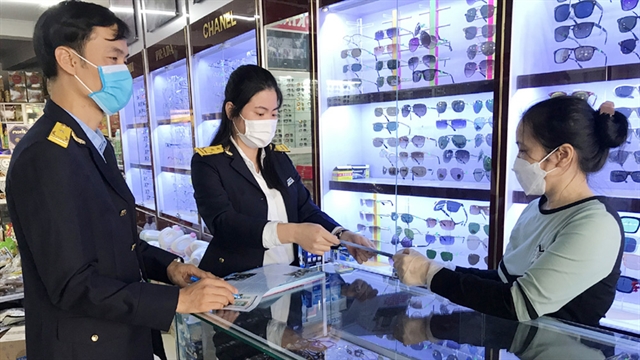 Society
Society

HÀ NỘI — According to Dương Thanh Tùng, Director of the Department of Agriculture and Rural Development in Bắc Giang, from now until 2025, the province is keen on promoting digital transformation in the agriculture and rural development sectors.
Bắc Giang is establishing a comprehensive data system for the agricultural industry, including information on land, crops, livestock, and aquaculture. This system serves state agencies' guidance and management tasks, as well as citizens' and enterprises' production and business activities. Additionally, the province is constructing a dataset to digitise all concentrated agricultural production areas linked with electronic diaries for product origin traceability. It involves assigning area codes, packaging facility codes, and identification codes for farms and livestock households, meeting the requirements of agricultural product consumption markets.

|
| Officials from the Tax Department from Lục Ngạn - Sơn Động are guiding business households to use electronic invoices generated from cash registers. |
From now until 2025, Bắc Giang focuses on developing digital technology applications, bringing key agricultural producers and the province's OCOP (One Commune One Product) products to the e-commerce market. The province is also leveraging digital transformation in managing and developing provincial-level OCOP products and in creating smart new rural areas.
Bắc Giang province is strongly emphasising developing high-tech agriculture towards smart and precise farming, aiming to increase the proportion of the digital agriculture sector in the economy to at least 15%. The province is actively applying blockchain technology for source traceability, area code assignment, and product tracing in a circular economy closely linked with e-commerce. Bắc Giang is committed to integrating agriculture with other industries and sectors to create a smart agricultural production system adaptable to climate change and diseases.
Furthermore, the province is constructing a Monitoring and Operation Center to manage and protect forests throughout its territory. Bắc Giang is building and expanding smart village models that leverage digital technology, supporting businesses and cooperatives in digital transformation within the agricultural sector. The development of electronic farming promotion, e-commerce, and the application of information technology and high-tech in data collection, information management, data analysis, disease and disaster alerts, and raw material zone management are also given significant attention.
At present, the Department of Agriculture and Rural Development in Bắc Giang is actively implementing the Monitoring and Operation Center for forest management and protection across the province. They have successfully deployed the Information System and Database on livestock in Bắc Giang province, as well as the Database Management System on aquaculture in the province, covering 10 districts and cities, to update the data into the system.
A total of 12 database layers, 726 entities, and 4,798 information nodes have been updated into the shared GIS-based irrigation database for Bắc Giang province. Additionally, 162 facilities have been updated in the database management software for issuing certificates of food safety and hygiene.
Bắc Giang has employed technology to create digitised maps of concentrated production areas, specialising in key and characteristic agricultural products. The province has also established area codes for cultivation (for areas over 10 hectares) and digitised concentrated fruit cultivation areas to manage the production processes adhering to standards such as VietGAP, GlobalGAP, and organic standards. This aims to ensure transparency of information, serving both domestic consumers and export markets. Notably, unmanned aerial vehicles have been applied for seeding, and pesticide spraying for rice and lychee crops.
In the livestock sector, Bắc Giang has applied information technology in disease management through the Online Animal Disease Information System (VAHIS).
In the aquaculture sector, Bắc Giang has implemented automation technology in the management, care, and breeding processes. This is achieved through the use of sensors, environmental measuring devices, oxygenation systems, automated feeding machines, integrated camera systems, and Internet connectivity through computers and phones for remote control. VNS




